The Vietnam Economic Growth Forum (VEGF) 2025 was co-organized on July 8 by the Vietnam Economic Association, the Vietnam Association of Small and Medium Enterprises, and Vietnam Economic Times/Tap chi Kinh te Viet Nam / VnEconomy, with the Party Central Committee's Commission for Policies, Strategies acting as the host.
In his opening remarks at the event, Mr. Tran Luu Quang, Secretary of the Party Central Committee and Head of the Committee's Commission for Policies, Strategies, emphasized that the forum provides a platform for government agencies, business community and experts to contribute ideas to help Vietnam realize its target of rapid and sustainable growth.
"We all aspire for our country to develop robustly. Perhaps the only way to achieve the growth goal is to bring together the contributions of everyone - all ministries, agencies, and localities nationwide. We have repeatedly set two centennial goals for 2030 and 2045 to ensure sustainable development, stability, and an improved quality of life for our people," Mr. Tran Luu Quang stated, raising the key question the forum must address:
"With the goal of achieving double-digit growth, what must we all do, and how should we do to achieve it? And how to encompasse both policy recommendations and concrete proposals at both central and local levels?" he raised a question..
Mr. Tran Luu Quang further revealed that in the process of drafting a policy report titled "Strategic solutions to promote double-digit growth in a new era – the era of the nation's rise," to be submitted to the Politburo and the Party Secretariat, the Commission for Policies, Strategies is adopting a reverse approach, one that ensures input from all components of the economy.
"If we were to independently write this policy paper, we could still get it done, submit it, and receive conclusions and directives. However, we fear it may not meet the expectations of all. Therefore, we are applying a reverse process, listening first to what people want and then trying to institutionalize, politicize, and formulate those wishes into concrete strategies and directives, provided they are innovative ideas. The ideas distilled from this forum will serve as essential contributions to the development of that report," he affirmed.
According to the Head of the Commission for Policies, Strategies, the Party and the State, in their drive to realize the nation’s aspirations and accelerate economic development, have already undertaken bold, revolutionary changes that inspire optimism and confidence across society. These include shifts in mindset and methodology, streamlined administrative structures, reorganized local governance, and the issuance of strategic resolutions designed to pave the way for a new chapter of national progress.
"These changes also place great pressure on us: how do we transform the words we have spoken and written into real wealth, into development, into a brighter tomorrow?" Mr. Tran Luu Quang concluded.
In his keynote speech, Deputy Prime Minister Nguyen Chi Dung hailed Vietnam’s 7.52% economic growth in the first half of 2025, the highest in 15 years, as a testament to its resilience amid global challenges. Economists, both domestic and foreign, have noted Vietnam’s ability to maintain strong momentum, with ambitions to hit 8% growth in 2025 and 10% or more annually from 2026 to 2030.
To achieve these targets, Deputy PM Dung outlined a sweeping agenda centred on legal and institutional reforms to enhance transparency, stability, and alignment with international standards. He called for urgent revisions to laws governing land, minerals, and planning, and immediate action to revive 2,887 stalled projects, which tie up over $235 billion in capital and 347,000 ha of land, to unlock resources for development.
Public investment, the Deputy PM stressed, must act as a catalyst to raise private capital, with a focus on modernising infrastructure, accelerating national projects, optimising energy systems, and promoting renewable and new energy sources tailored to each stage of development. He advocated leveraging new growth spaces through administrative reforms, including merging localities and adopting a two-tier local administration model, while tapping into sci-tech, innovation, digital transformation, artificial intelligence, semiconductors, and quantum technology.
The Deputy PM also championed new economic models, including free trade zones and financial centres paired with quality workforce training and global talent networks.
“These are key drivers to restructure the economy, establish a new growth model, and push for rapid and sustainable development based on science, technology, innovation and digital transformation, thereby delivering breakthroughs in the new era of growth,” he said.
In parallel with attracting major strategic investment projects, he also called for progress in international integration in the current context.
"This means domestic resources must be the foundation, while external resources should supplement and support development," the Deputy PM explained, adding that the integration process must ensure national independence, resilience and adaptability in the face of global disruptions.
The vision of a prosperous and powerful Vietnam would require joint efforts from the public as well as the private sector, in order to make the nation a safe, attractive destination and a regional and global hub for manufacturing, services and innovation, Deputy PM Dung said.
According to the organisers, the VEGF is expected to become an annual event with plenary and thematic sessions, aiming to bridge policymakers and key stakeholders, and foster stronger alignment between government policies and business practices.









 Google translate
Google translate